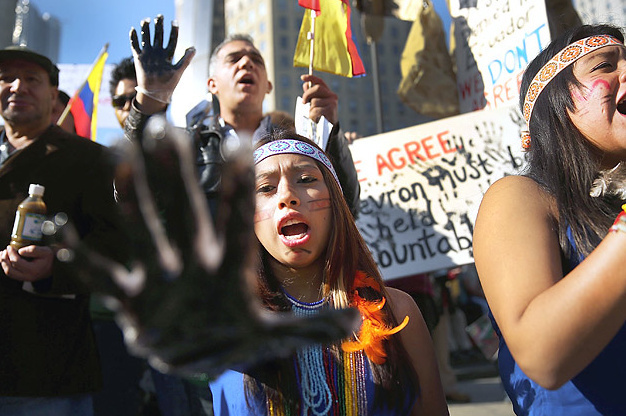 My latest article for VICE:
My latest article for VICE:
When 30,000 Ecuadorian villagers sued Chevron in 1993 for devastating the Amazon with 18 billion gallons of toxic wastewater, the US-based oil giant’s reply was simple: “We will fight [the lawsuit] until hell freezes over,â€Â said a representative. “And then fight it out on the ice.”
After investigators documented what they call a “Rainforest Chernobyl”—17 million gallons of spilled crude oil, more than 1,000 open waste pits full of toxic waste polluting the drinking water, and thousands of victims of cancer and birth defects—it seemed justice was served for the villagers. In 2011, an Ecuadorian court ruled against Chevron and demanded the company pay $19 billion in restitution. Ecuador’s Supreme Court later reduced the damages to $9.5 billion but upheld that ruling.
But on Tuesday, a U.S. court effectively overturned the ruling, which means Chevron has won the fight and hell, apparently, has frozen over. They’ve won using what activists say are dirty tactics, including filing a countersuit against the Ecuadorian villagers, claiming they had lied all along about the pollution caused to their properties as part of a shakedown scheme.
Chevron hired a legal team of more than 60 law firms and 2,000 legal professionals to argue that it’s not the villagers who are the victims here—it’s the corporation.
The villagers won in Ecuadorian court fraudulently, Chevron argued, because their lead attorney, Steven Donziger, used bribery and fabricated evidence. One of the primary claims is that a scientific report by an Ecuadorean court-appointed expert was created by activists. Donziger admits activists coordinated with the scientific firm, but argues that the science is entirely sound and denies any wrongdoing on this or any other of Chevron’s charges. He says the lawsuit is “the most well-funded corporate retaliation campaign in history.”
Because he was charged of fraudulence, Donziger is liable under the civil provisions of RICO, the Racketeer Influenced and Corrupt Organizations Act. It’s the law designed to go after the mafia.
The company had sought $60 billion in damages against Donzinger in its RICO suit, saying that the pollution claims are a carefully orchestrated campaign by Donziger to get into Chevron’s deep pockets. The claims for damages were eventually dropped. But this week Chevron won its RICO suit to evade payment. Now it will be even harder, if not impossible, for Donziger and the villagers to enforce the Ecuadorian’s court’s judgment against Chevron.
Environmental groups believe this ruling has far-reaching implications beyond the Amazon, though. They say it signals a new trend in how corporations silence their opposition. More than 44 of them—including the Sierra Club and 350.org—signed a letter opposing the lawsuit, calling it a “growing and serious threat to the ability of civil society to hold corporations accountable for their misdeeds around the world.”
Paul Paz y Miño of Amazon Watch says this kind of tactic could be used by any industry to avoid accountability. Environmentalists and consumer groups don’t have the money to fight a corporate army of attorneys. “If they don’t have the resources to make that fight legally, they may have to just pick another campaign,” he warns. “And it would end there.”
Those fears appear to be warranted. Corporate attorneys are already saying this is “the new model for fighting back” for big business.
It’s a new model that directly puts journalists at risk, as well. As part of its lawsuit, Chevron also fought to force documentary producer Joe Berlinger to turn over 600 hours of raw footage— a move opposed by the New York Times, ABC, CBS, and many other media outlets. The footage included what Berlinger saw in Ecuador: an ecosystem under assault. The tapes also included fly-on-the-wall recordings of strategy sessions with the legal team, and Chevron says it could help its case. But the media outlets warned that Chevron is bullying journalists.
Chevron also fought to get access to its critics’ personal information, including the IP addresses and identities of more than 100 email accounts of environmentalists and journalists.
Going after protesters, lawyers, and journalists as gangsters is particularly ironic considering that this is the same Chevron that hired the Nigerian military to violently shut down protests by unarmed fisherman and villagers in Nigeria, as exposed in an award-winning documentary by Amy Goodman and Jeremy Scahill.
The fight in this case is still not over. The coalition of groups involved say they’ll keep pushing forward to hold Chevron accountable.
Han Shan, the US spokesman for the Ecuadorian villagers, says the focus is now on “enforcing their judgment in countries where they can receive a fair hearing.”
Chevron and other corporations will only be emboldened, though. As the right-wing blog Hotair.comnoted, “Is there any way at this point for Chevron to turn this around and drag Donziger [the lead attorney] and company, along with the Ecuador court actors, into a court someplace and drain every last cent out of them until they have to live under a bridge somewhere?”
Will Potter is a journalist and TED Fellow based in Washington, DC. Visit his website and follow him on Twitter.